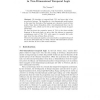446 search results - page 16 / 90 » Modal Logics for Timed Control |
LOGCOM
2007
13 years 8 months ago
2007
The syntactic approach to epistemic logic avoids the logical omniscience problem by taking knowledge as primary rather than as defined in terms of possible worlds. In this study, ...
DLOG
1998
13 years 10 months ago
1998
Effective systems for expressive description logics require a heavily-optimised subsumption checker incorporating a range of optimisation techniques. Because of the correspondence...
ETRA
2008
ACM
13 years 10 months ago
2008
ACM
We investigate consciously controlled pupil size as an input modality. Pupil size is affected by various processes, e.g., physical activation, strong emotional experiences and cog...
PDP
1997
IEEE
14 years 1 months ago
1997
IEEE
Event tracing and monitoring of parallel applications are difficult if each processor has its own unsynchronized clock. A survey is given on several strategies to generate a glob...
ICTL
1994
14 years 1 months ago
1994
We introduce a temporal logic TAL and prove that it has several nice features. The formalism is a two-dimensional modal system in the sense that formulas of the language are evalua...

